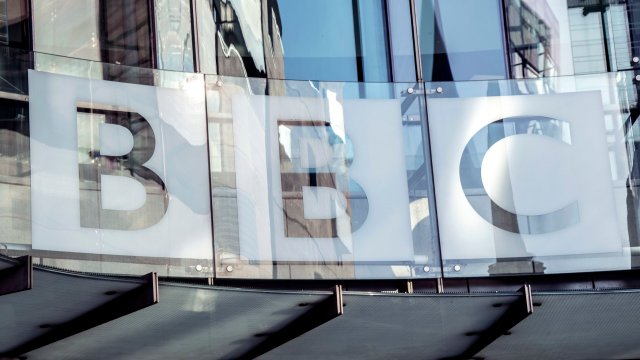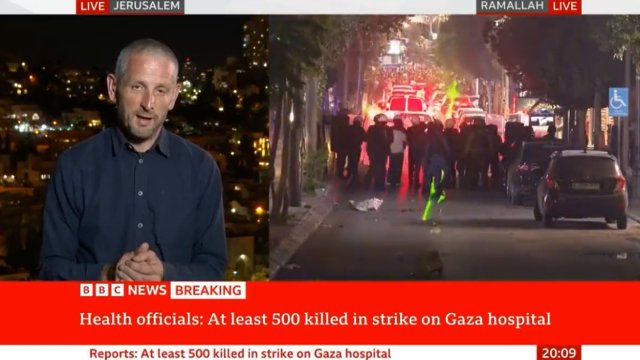The BBC’s Israel-Gaza reporting has inflicted lasting damage on its …
Opinion i media columnist
This fast-moving story of unrivalled sensitivity and complexity has too often exposed the BBC's failings
November 20, 2023 4:36 pm
 Many of the BBC's editorial errors have occurred on rolling news services, not on the flagship TV and radio bulletins.
Many of the BBC's editorial errors have occurred on rolling news services, not on the flagship TV and radio bulletins.
But damage has been done (Photo: Ian West/PA Wire)
The devastating violence unfolding in the Israel-Gaza conflict might be good from a ratings point of view for BBC News, but it has almost certainly inflicted lasting damage on its global reputation for trusted reporting. This fast-moving story of unrivalled sensitivity and complexity has tested to the limit the BBC's capacity for immediate, independent and incontrovertible journalism and, too often, exposed its failings. It stands accused of bias by Israel, especially over its initial coverage of the al-Ahli Arab hospital explosion[1].
Simultaneously, pro-Palestinian groups are furious at the BBC for casually labelling them as supporters of Hamas. In both cases, the attacks on BBC News are justified. Indeed, it has issued corrections of its flawed reporting.
Meanwhile, thousands of dedicated BBC journalists continue to report the heart-rending developments in Israel and Gaza, day and night, on television, radio and online, in 43 languages around the world, often providing exceptional levels of insight and expertise. Israel-Gaza has become so polarised that it is hurting the BBC. Covering the pandemic and Russia's invasion of Ukraine[2] were opportunities for BBC News and, although they came with major logistical difficulties, allowed the newsroom to perform a public service in reporting on clear global threats.
The events we are watching unfold in Gaza split public opinion, just as Brexit tore the UK in two, and the Scottish independence referendum divided people north of the border. In its coverage of all these stories, the BBC has suffered claims of bias from supporters of both sides, who often vow never to watch or listen to its output again. The BBC remains the most trusted news brand in the UK, but its trust levels have fallen from 75 per cent to 55 per cent since 2018, according to the Reuters Institute for the Study of Journalism.
This conflict could further reduce that score. Complaints over the BBC's coverage are reported to be evenly split between those claiming anti-Israel bias and those who detect prejudice against Palestinians. Deborah Turness, head of BBC News, is right not to claim this as an indication that coverage is on the right track.
For years, the BBC has hidden behind the idea that diametric accusations of bias - from Conservatives and Labour, or Brexiteers and Remainers - amount to a good thing.
Related Article

In a blog[3], Turness recognised that such complacent dismissal of criticism from all sides "isn't good enough for the BBC or for our audiences". She acknowledged that mistakes have been made and said it was important that BBC News "own our own errors and apologise for them". But mistakes that once would have followed a slow and formal complaints procedure, today quickly escalate online into international political rows.
The BBC's most damaging misstep was the reporting of the al-Ahli Arab[4] hospital blast by experienced correspondent Jon Donnison, who implied to BBC News Channel viewers that Israel was responsible[5], saying: "It's hard to see what else this could be." In fairness, many other news outlets wrongly suggested that an Israeli rocket was responsible - rather than a misfired Palestinian missile. But Donnison's speculation allowed arch BBC critic Nadine Dorries to ask: "Who is this propagandist on the BBC?"
Then a BBC News Channel anchor misquoted a Reuters report and said Israeli forces were "targeting" medical teams and Arab speakers. The BBC coverage has "alienated the Jewish community", claimed[6] The Jewish Chronicle. Israel's government accused the BBC of a "blood libel".
Pro-Palestinian demonstrators were angered by BBC newsreader Samantha Simmonds referring to their "backing for Hamas". Separately, a pro-Palestinian group sprayed red paint on the doors of the BBC and accused it of having "blood on its hands". The BBC is in a bind. "The difficulty of reporting from the Middle East is that what people really want, even if they realise you have to represent all views, is for you to come down on their side," Jeremy Bowen told me back in 2006.
Addressing the future of the Middle East, he warned that "something terrible could be lying ahead of us unless we are very careful". As BBC International Editor, Bowen is working with the BBC's chief international correspondent Lyse Doucet on The Conflict, a podcast aimed at making more sense of this crisis. The pair have been reporting on the Middle East since before some of the BBC's current critics were born.
The awful scenes and footage that some BBC staff witness, and the abuse they can suffer in person or online, are so extreme that they are being offered mental health support by the organisation. Many of the BBC's editorial errors have occurred on rolling news services, not on the flagship TV and radio bulletins. But damage has been done.
In this seemingly never-ending conflict there are only losers, and that includes the reputation of BBC News.
References
- ^ al-Ahli Arab hospital explosion (inews.co.uk)
- ^ Russia's invasion of Ukraine (inews.co.uk)
- ^ blog (www.bbc.co.uk)
- ^ al-Ahli Arab (inews.co.uk)
- ^ who implied to BBC News Channel viewers that Israel was responsible (inews.co.uk)
- ^ claimed (www.thejc.com)